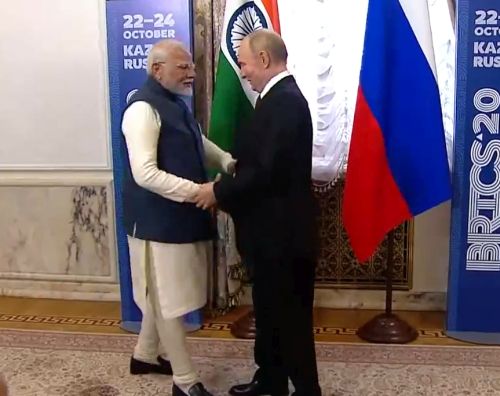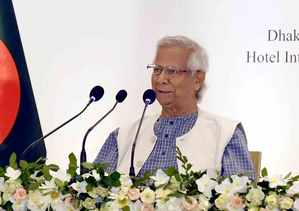International
Climate change made extreme April temperatures hotter affecting billions in Asia: Study
New Delhi, May 15 (IANS) Extreme temperatures above 40 degrees Celsius that impacted billions of people across Asia in April were made hotter and more likely by human-caused climate change, according to rapid attribution analysis by an international team of leading climate scientists from the World Weather Attribution group.
The study highlights how heatwaves intensified by climate change are making life much tougher for people living in poverty across Asia and the 1.7 million displaced Palestinians in Gaza.
Asia was hit by severe heat waves this April. In South and Southeast Asia, Myanmar, Laos and Vietnam broke records for their hottest April day, and the Philippines experienced its hottest night ever.
In India, temperatures reached as high as 46 degrees.
The heat was also extreme in West Asia, with Palestine and Israel experiencing temperatures above 40 degrees. The month was the hottest April on record globally and the eleventh consecutive month in a row a hottest month record was broken.
Heat-related deaths were widely reported, with at least 28 in Bangladesh, five in India and three in Gaza during April, while surges in heat deaths have also been reported in Thailand and the Philippines this year.
These are only preliminary figures and because heat-related deaths are notoriously underreported, it is likely there were hundreds or possibly thousands of other heat-related deaths in Asia during April.
The heat also led to crop failure, loss of livestock, water shortages, mass die-off of fish, widespread school closures, and the heat has been linked to low voter turn-out in Kerala.
Climate change, caused by burning oil, coal and gas, and other human activities like deforestation, is making heatwaves more frequent, longer and hotter around the world. To quantify the effect of human-caused warming on the extreme temperatures across Asia, scientists analysed weather data and climate models using peer-reviewed methods to compare how these types of events have changed between today’s climate, with approximately 1.2 degrees of global warming, and the cooler pre-industrial climate.
The analysis focused on the periods when the heat was most dangerous in two regions: the three-day average of maximum daily temperatures in a region of West Asia that included Syria, Lebanon, Israel, Palestine and Jordan, and the 15-day average of maximum daily temperatures in the Philippines.
The scientists also analysed the possible influence of the El Niño–Southern Oscillation, a naturally occurring climate phenomenon that shifts between El Niño, neutral and La Niña conditions.
The study also analysed historical weather data for a region of South Asia that includes India, Bangladesh, Myanmar, Laos, Vietnam, Thailand and Cambodia. The researchers did not carry out a full attribution analysis for this region as the World Weather Attribution conducted similar studies in 2022 and 2023, and the data from weather observations showed that the attribution results would not be significantly different.
In West Asia, the scientists found that April heatwaves with temperatures above 40 degrees are more frequent due to warming caused by human activities. In today’s climate, with 1.2 degrees of warming, similar heatwaves are expected to occur about once every 10 years.
Climate change made the heat about five times more likely and 1.7 degrees hotter. In the future, extreme temperatures in West Asia could become even more frequent and intense. If warming reaches 2 degrees, as they are expected to in the 2040s or 2050s unless emissions are rapidly halted, similar heatwaves will occur about once every five years and will become another one degrees hotter, the study noted.
El Nino does not have an influence on the high temperatures in West Asia.
The study was conducted by 13 researchers, including scientists from universities and meteorological agencies in Malaysia, Sweden, the Netherlands, and Britain.
Mariam Zachariah, Researcher at the Grantham Institute — Climate Change and the Environment, Imperial College London, said: “Climate change is bringing more days with potentially deadly temperatures to Asia every year. This result is unsurprising, but important for highlighting the dangers of extreme heat in Asia.
“Unless the world takes massive, unprecedented steps to reduce emissions and keep warming to 1.5 degrees Celsius, extreme heat will lead to even greater suffering in Asia,” Zachariah added.
–IANS
vg/sha
International
Lee Hsien Yang seeks refuge in United Kingdom

Lee Hsien Yang, the youngest son of Singapore’s founding father, the late Lee Kuan Yew, announced on Tuesday that he is now a political refugee in the United Kingdom after seeking asylum from the British government “as a last resort.”
“I remain a Singapore citizen and hope that someday it will be safe to return home,” Lee stated in a Facebook post, as reported by Channel News Asia (CNA).
Citing what he described as the Singapore government’s “attacks” against him, Lee, who is the younger brother of former Prime Minister Lee Hsien Loong, revealed that he sought asylum protection in 2022.
Lee Hsien Yang and his late sister, Lee Wei Ling, who passed away earlier this month, have been in conflict with their brother Lee Hsien Loong over the fate of their father’s home following his death in 2015, resulting in a public dispute that has estranged the siblings.
In an interview with the UK-based newspaper The Guardian, Lee alleged that a “campaign of persecution” compelled him to seek asylum in Britain.
In response to his claims, the Singapore government stated that there is “no basis” for his allegations of “a campaign of persecution” or other assertions regarding political repression in the country.
“Singapore’s judiciary is impartial and makes decisions independently. This is why Singaporeans have a high level of trust in the judiciary,” a government spokesperson remarked.
The spokesperson added that there are no legal restrictions preventing Lee and his wife, lawyer Lee Suet Fern, from returning to Singapore. “They are and have always been free to return to Singapore,” the spokesperson said.
Lee and his wife have been outside of Singapore since 2022, having opted not to attend a scheduled police interview regarding potential offenses related to providing false evidence in judicial proceedings concerning their father’s will and the family home.
Lee and his late sister, who had been living at the property, alleged they felt threatened while trying to fulfill their father’s wish to demolish the house. They also accused their elder brother, former Prime Minister Lee Hsien Loong, of abusing his governmental influence to advance his personal agenda.
International
Indo-Russian ties are stronger than ever before at BRICS

Kazan, Russia: Prime Minister Narendra Modi held a bilateral meeting with Russian President Vladimir Putin on the sidelines of the 16th BRICS Summit.
During the meeting, President Putin remarked, “I recall our meeting in July, where we had productive discussions on various issues. We’ve also spoken over the phone several times. I am very grateful you accepted the invitation to come to Kazan. Today, we will attend the BRICS Summit’s opening ceremony, followed by dinner.”
PM Modi responded by expressing his appreciation, saying, “I sincerely thank you for your friendship, warm welcome, and hospitality. It’s a great pleasure to visit such a beautiful city as Kazan for the BRICS Summit. India shares deep historical ties with this city, and the opening of our new embassy here will further strengthen these connections.”
International
Laos seeks to enhance nutrition amid climate change concerns

Vientiane (Laos), Aug 22 (IANS) Representatives from the Lao government and development partners have attended a conference here titled “Climate Change and Nutrition in Laos: Intersections and Interventions” to discuss the impact of climate change on nutrition in the Southeast Asia country and potential solutions.
Speaking at the conference, deputy director general of the Department of Hygiene and Health Promotion under the Lao Ministry of Health Viengkhan Phixay, said, “We gather to address a critical and interwoven issue: the impact of climate change on nutrition and how we can work together to tackle these challenges,” Xinhua news agency reported.
The Lao government is actively engaged in this endeavor, with numerous policies and initiatives aimed at addressing both climate change and nutrition, Lao National Television reported on Thursday.
“By leveraging the Scaling Up Nutrition network in Laos, which is led by the government, and supported by civil society, donors, and the United Nations, we have a robust platform to tackle the negative impacts of climate change while improving nutrition and overall health for everyone in Laos,” Viengkham said at the conference held on Monday.
The conference featured a series of presentations that not only detailed evidence-based research but also introduced innovative tools for measuring and enhancing nutrition under the impact of climate change.
The conference stressed the critical need for integrated approaches to tackle the intertwined challenges of climate change and nutrition, and setting the stage for impactful future collaborations.
–IANS
int/psd
International
One killed, seven injured in shootout in Iraq

Baghdad, Aug 22 (IANS) A civilian was killed while seven others were injured on Thursday in a tribal shootout in Iraq’s holy Shiite province of Najaf, according to a local security source.
The shootout erupted in the early hours between armed men from the local tribe in the al-Zarga area in northern Najaf, some 160 km south of Baghdad, a local police officer told Xinhua on condition of anonymity.
The clash resulted in the killing of an Iraqi civilian and the injury of seven others, including three Iranian Shiite pilgrims, the source added.
A joint force from the Interior Ministry’s emergency response division and Najaf provincial police arrested 53 gunmen from both sides of the shootout and seized weapons and ammunition, the Interior Ministry said in a statement.
It added that search operations are ongoing to locate additional gunmen and weapons, with more details to be released later.
The incident took place as numerous pilgrims traveled to the city of Karbala to observe Arbaeen, which marks the end of a 40-day mourning period for the killing of Imam Hussein, the grandson of Prophet Muhammad, in the Battle of Karbala in 680 A.D.
Typically, these pilgrims also visit Najaf as part of their journey to Karbala.
–IANS
int/jk/arm
International
Bangladesh seeks $1 billion budget support from World Bank

Dhaka, Aug 22 (IANS) Bangladesh’s interim government has sought $1 billion from the World Bank as budgetary support.
The call came from the country’s Power, Energy and Mineral Resources Adviser Muhammad Fouzul Kabir Khan’s meeting with Abdoulaye Seck, the World Bank’s Country Director for Bangladesh and Bhutan, in Dhaka on Wednesday.
He made the plea as the ministry owes more than 2 billion dollars to suppliers in import costs of power and energy, Xinhua news agency reported.
Khan mentioned that the interim government, which was formed with many pressing mandates, is due to settle a $2 billion debt left by the previous government in the power sector.
He said they have already suspended activities under the much-criticized Quick Enhancement of Electricity and Energy Supply Act 2010 and abolished the government’s power to set energy prices without any public hearing.
On August 5, the former Prime Minister of Bangladesh, Sheikh Hasina, was ousted from her country and power, ending her rule since January 2009.
This event was seen as a massive escalation, with what initially started as student’s protests and resulted in a major crisis in Bangladesh.
Earlier on August 8, Nobel laureate Muhammad Yunus took oath as the head of Bangladesh’s interim government.
–IANS
int/jk/as
-
Video2 years ago
PM Modi Attacks Congress in Karnataka with “Kerala Story”
-
Politics2 years ago
Siddaramaiah & DK Shivakumar sworn in as Chief Minister & Deputy CM respectively
-
Cricket2 years ago
CSK players rejoice 5th IPL title with their families (Pics)
-
Entertainment2 years ago
Karan Deol weds his longtime Girlfriend Drisha Acharya (Pics)
-
Sports7 years ago
History Of Official FIFA WORLD CUP Match balls
-
India2 years ago
Ashwini Vaishnaw: Railway Board recommends CBI probe in the Odisha railway disaster
-
Entertainment2 years ago
Urvashi Rautela dazzles on Cannes 2023 red carpet (Pics)
-
Entertainment2 years ago
Sunny Leone gets ready for Kennedy premiere in Cannes (Pics)






























